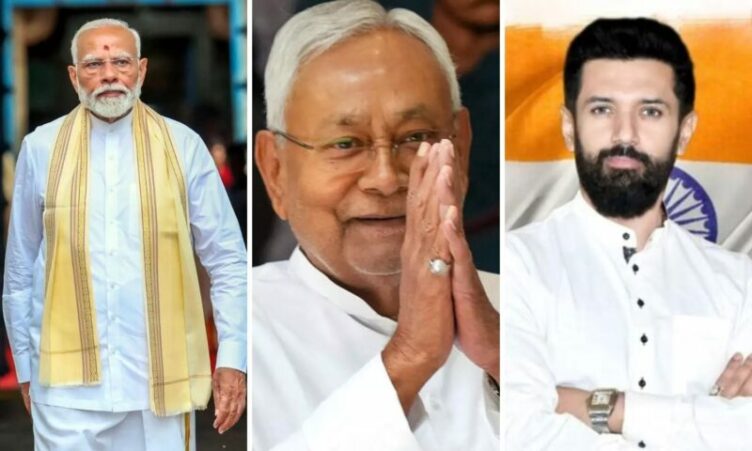
The announcement of the National Democratic Alliance’s (NDA) seat-sharing formula for Bihar’s 2025 Assembly elections has sparked intense debate, with opposition leaders questioning whether Chief Minister Nitish Kumar will remain in his position or if this represents a calculated political maneuver by the BJP.
Historic Equal Partnership Raises Eyebrows
For the first time since their alliance began in 1996, the Bharatiya Janata Party (BJP) and Nitish Kumar’s Janata Dal (United) will contest an equal number of seats – 101 each out of the total 243 Assembly constituencies. This marks a significant departure from previous arrangements where JDU typically held the dominant position as the “big brother” in the alliance.
In the 2020 elections, JDU contested 115 seats while BJP fought 110, clearly establishing JDU’s senior status. However, the electoral outcome told a different story – BJP won 74 seats with a strike rate of 68%, while JDU managed only 43 seats with a disappointing 38% success rate.
Opposition Leaders Cry Conspiracy
Independent MP from Purnia, Pappu Yadav, has launched the most scathing attack on the seat-sharing arrangement, declaring it a “conspiracy to politically finish Nitish Kumar”. In a dramatic social media post, Yadav accused JDU national executive president Sanjay Kumar Jha of orchestrating this move, stating: “Sanjay Jha accomplished his mission today. The plot to finish off Nitish is complete”.
Yadav’s criticism centers on the belief that this formula was designed to force Nitish Kumar into a weakened position, essentially making him a “political corpse”. He suggested that the BJP’s strategy aims to sideline Kumar after the elections and claim the Chief Minister’s position for itself.
RJD leader Mrityunjay Tiwari echoed similar concerns, warning that “after elections, BJP will eliminate JDU”. He pointed out that while JDU previously enjoyed elder brother status, it has now been “brought to the same level,” with the BJP effectively gaining control over 130 seats when combined with Chirag Paswan’s allocation.
The Chirag Paswan Factor
A key element in this political equation is the significant role played by Chirag Paswan’s Lok Janshakti Party (Ram Vilas), which secured 29 seats after intense negotiations. Initially demanding 40 seats, Paswan’s party eventually settled for 29, with BJP sources acknowledging that “LJP (RV) has still received more seats than it deserves”.
The substantial allocation to Paswan’s party has raised questions about whether this represents a strategic move by the BJP to further diminish JDU’s influence within the alliance. Congress MP Manoj Jha questioned the arrangement, asking whether such minimal allocations to other Dalit leaders like Jitan Ram Manjhi (6 seats) truly represent respect for their communities.
Strategic Political Calculations
Political analysts suggest that the equal seat-sharing arrangement may be a calculated move by the BJP to position itself for claiming the Chief Minister’s post if JDU performs poorly again. The formula could serve as a “gateway” for the BJP’s next power move, particularly if JDU wins fewer seats than the BJP despite contesting equal numbers.
This strategic positioning becomes more significant when considering that in 2020, despite JDU’s poor performance with only 43 seats compared to BJP’s 74, Nitish Kumar retained the CM position largely due to the BJP’s lack of a leader with matching stature and experience.
Mahagathbandhan’s Response Strategy
While the NDA finalized its arrangement relatively quickly, the opposition Mahagathbandhan continues to struggle with its own seat-sharing negotiations. This delay has given the NDA a psychological and organizational advantage, with BJP leaders mocking the opposition alliance as “Lathbandhan” (stick alliance) due to internal conflicts.
Congress general secretary Jairam Ramesh indicated that party president Mallikarjun Kharge has been in discussions with coalition partners, with RJD leaders Lalu Prasad and Tejashwi Yadav expected to meet Congress leadership in Delhi.
Historical Context and Implications
The shift to equal partnership represents a dramatic realignment in Bihar politics. JDU’s seat share has fallen by 29% over the past 15 years, from its dominant position to this equal footing with the BJP. This change reflects the party’s declining electoral performance and the BJP’s growing influence in the state.
The arrangement also eliminates the traditional “big brother, small brother” dynamic that has characterized the alliance, with senior BJP leaders describing it as a “practice in parity” rather than “pressure politics”.
As Bihar heads toward elections scheduled for November 6 and 11, with results on November 14, the equal seat-sharing arrangement has set the stage for a high-stakes political battle. The opposition’s questioning of this formula as a potential “game” against Nitish Kumar reflects deeper concerns about the future of regional leadership in Bihar politics.
The ultimate test will come at the ballot box, where voters will determine whether this historic equal partnership strengthens the NDA or validates opposition claims about internal power struggles that could reshape Bihar’s political landscape for years to come.